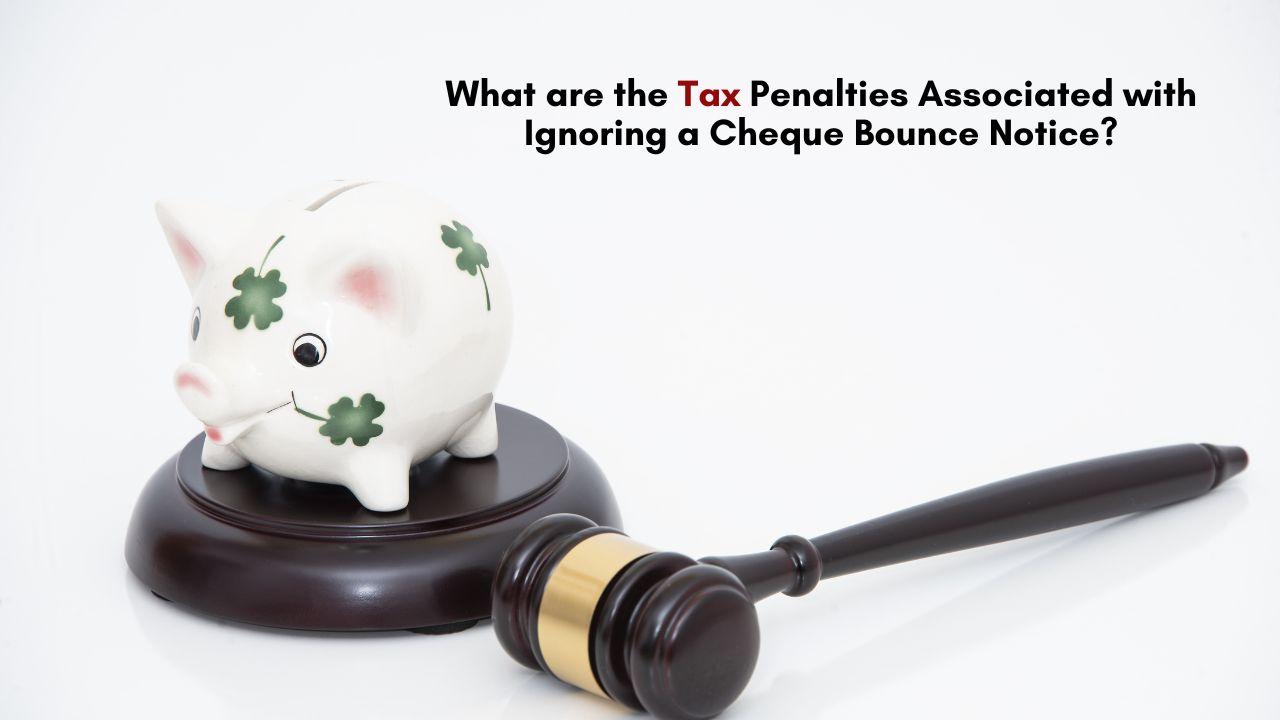Introduction
In India, cheque bounce cases are regulated under Section 138 of the Negotiable Instruments Act, 1881. Ignoring a cheque bounce notice can lead to serious legal and financial consequences, including hefty tax penalties. Understanding the implications and addressing the issue promptly can help businesses and individuals avoid unnecessary complications. This blog delves into the tax penalties and associated legal consequences of ignoring a cheque bounce notice.
Understanding a Cheque Bounce Notice
A cheque bounce notice is a formal communication sent by the payee to the issuer of a dishonored cheque. This notice serves as a warning and provides an opportunity for the issuer to rectify the situation. Under the law, the payee must issue the cheque bounce notice within a specific period after the cheque is dishonored.
The cheque bounce notice period is critical, as the issuer is granted 15 days to make the payment after receiving the notice. Ignoring this notice can escalate the issue, leading to legal proceedings and tax implications.
Tax Penalties for Ignoring a Cheque Bounce Notice
Failure to act on a cheque bounce notice can attract tax-related penalties in addition to legal repercussions. Some of the primary penalties include:
-
Additional Tax Liabilities
When a cheque issued to pay taxes bounces, it is treated as non-payment of tax. This can lead to interest accrual on the unpaid tax amount and penalties under the Income Tax Act. Tax authorities may levy monthly penalties of up to 1% of the outstanding tax amount until the dues are cleared. -
Disallowance of Deductions
Businesses that issue cheques for expenses claimed as deductions may lose the benefit of these deductions if the cheque bounces. This can increase the taxable income, resulting in higher tax liabilities. -
Legal Costs and Fines
Alongside tax penalties, businesses and individuals may face fines and legal costs for defending a case under Section 138. These costs can add to the financial burden.
Legal Process for a Cheque Bounce Notice
The legal process for handling a cheque bounce case is straightforward but time-sensitive. When the payee sends a legal notice, the issuer must act within the prescribed legal notice time period, usually 15 days. Failing to respond or settle the dues can result in criminal proceedings.
Once a case is filed, the court may impose fines or even a prison term in severe cases. Such legal entanglements can have long-term repercussions, including negative impacts on credit ratings and the ability to conduct business effectively.
Steps to Address a Cheque Bounce Notice
-
Acknowledge the Notice
The first step is to acknowledge the cheque bounce notice. Ignoring it can lead to an escalation of the issue into a legal case. -
Settle the Amount
Pay the outstanding amount, including any applicable interest, within the cheque bounce notice period to avoid legal action. -
Seek Legal Counsel
Consulting a legal expert can help mitigate risks and navigate the complexities of cheque bounce laws. They can help draft responses to the notice and negotiate with the payee if required. -
Rectify Financial Records
Ensure that the dishonored cheque is accounted for in financial statements and that necessary amendments are made to reflect the correct tax liabilities.
Preventing Cheque Bounce Issues
To avoid the complications arising from cheque bounce cases, businesses and individuals should adopt preventive measures:
-
Maintain Sufficient Bank Balance
Ensure that the account has adequate funds before issuing a cheque. Regularly monitor account balances to avoid unintentional defaults. -
Verify Details Before Issuance
Double-check all details, including the payee’s name, date, and amount, before issuing a cheque. -
Use Alternative Payment Methods
Opt for online transactions or other electronic payment methods that are faster and less prone to errors compared to cheques.
Legal Notice for Non-Payment of Salary and Cheque Bounce Cases
In cases where employees issue cheques for non-payment of salaries, ignoring a legal notice for non-payment of salary can worsen the situation. Employers are obligated to settle dues within the prescribed time after receiving a legal notice to employer for non-payment of salary.
Failure to do so can lead to a dual impact: financial penalties for dishonored cheques and additional penalties under labor laws. Employees may seek legal recourse to claim their unpaid wages, further compounding the employer’s liabilities.
Consequences of Ignoring a Legal Notice
Ignoring a legal notice for a dishonored cheque can lead to severe consequences, including:
-
Court Proceedings
Once the payee files a case, the issuer must appear in court and face the possibility of a conviction. -
Financial Penalties
The court may order the issuer to pay the cheque amount along with interest and additional fines. In extreme cases, imprisonment for up to two years may also be imposed. -
Reputational Damage
Businesses and individuals may suffer reputational harm, which can affect relationships with clients and partners.
Legal Provisions Related to Cheque Bounce Cases
Section 138 of the Negotiable Instruments Act outlines the legal framework for dealing with cheque bounce cases. It emphasizes the importance of honoring financial commitments and penalizes those who fail to comply. The provisions include criminal and civil liabilities, ensuring that payees are adequately compensated for the inconvenience caused.
Conclusion
Ignoring a cheque bounce notice is not only a violation of legal obligations but also a financially unwise decision. The associated tax penalties, legal costs, and reputational damage can be overwhelming. Addressing the issue promptly by paying the dues, acknowledging the notice, and seeking legal advice is essential for mitigating risks. By maintaining good financial practices and adhering to legal requirements, businesses and individuals can avoid the pitfalls of cheque bounce cases.



